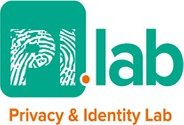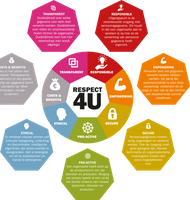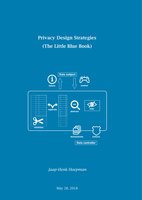PI.lab supports good practice
The PI.lab develops new approaches that might help organisations to include privacy in their information architecture and in their business processes. The PI.lab considers privacy to be an enabler of innovation, to the benefit of individuals and the organisations implementing novel solutions and approaches. In order to promote good practices we have produced a number of easy to read brochures and books.
The Little Blue Book (Jaap-Henk Hoepman, May 2018) introduces eight privacy by design strategies an organisation may use in order to process personal data in a responsible manner. Four strategies are dedicated to processing the data, two demonstrate how informed control can be offered to data subjects, and two deal with enforcement of privacy by design within an organisation.
The RESPECT4U model (Marc van Lieshout, Somayeh Djafari and Petra Vermeulen, 2017) presents seven privacy principles an organisation could abide to responsibly process personal data. Empowerment, Secure data handling, Pro-activity, Ethical concerns, Cost-Benefit-Analysis and Transparency complement the Responsible processing.
If you would like to understand what the GDPR means for you, the introduction to the GDPR written by Bart van der Sloot (May 2018) might be of help. The title of the book expresses the intention of the author: 'De Algemene Verordening Gegevensbescherming in gewone mensentaal.' Dutch only!
How the PI.lab can help you
The PI.lab works for external parties. Senior and junior researchers of the three participating institutes enable the coverage of complex, multi-stakeholder, multi-perspective studies as well as the production of strategy papers, technical research and policy studies. The studies performed meet standard academic criteria, including publication procedures (KNAW guidelines). Researchers have contributed to outlining, elucidating, explaining and discussing state-of-the-art issues by participating to presentations, workshops and panels for various clients, for public and private audiences.
The PI.lab already was active in various kinds of research, focusing on fundamental break-throughs and innovations and supporting policy oriented goals of its clients. Research is sometimes done by a single researcher of one institute, advised and supervised by researchers of the joining institutes, and sometimes by a combination of researchers of the various institutes. Information on these studies can be found on the PI.lab website.
You always can approach us to explore the potential contribution of PI.lab to requests you may have. We offer the following kind of services:
- Delivering presentations at conferences, meetings, round tables, workshops
- Organising workshops/panels that are focused on a specific problem area
- Executing studies that help sorting out strategic, policy-oriented and technical challenges
- Supporting policy-oriented activities (“Action Programmes”) in which PI.lab helps initiating and executing activities that address policy relevant issues.
Ad A: Delivering presentations
If you are interested in having state-of-the-art overviews of topics which are of interest for you and your organization, feel free to ask whether we can help you out. We can tap into a large pool of experts that are able to present in a concise and understandable manner complex topics, be it on novel cryptographic developments, identity management systems, privacy design strategies and approaches, or critical reflections on robotics, algorithmic transparency and user empowerment for privacy in data driven innovations. Presentations can be tailored to what you need.
For further information, see the expertise of our researchers included in their CV.
Ad B: Organising workshops and panels
In helping your organisation to advance the way of working with privacy-related issues a workshop might be a good starting point. The PI.lab can help in preparing and organizing such workshops. These might cover issues as wide ranging as
- developing a strategy concerning the implementation of the GDPR;
- exploring the potential of new identity and access management systems;
- the critical reflection upon the introduction of new surveillance and observation systems within the organization;
- the options for the implementation of privacy dashboards;
- any other subject of relevance for your organization in relation to privacy
Engagement of the PI.lab could be limited to one single workshop or to a more extensive programme of related workshops. A more limited form of presentation could be the active contribution of PI.lab researchers to panels you organize. Of course, the PI.lab can take over the organization of the panel, if you would like us to do.
For further information, please contact Marc van Lieshout
Ad C: Executing studies
The bread and butter of the work of our researchers is developing innovations that promote privacy friendly solutions to societal issues. The three participating institutes all have their core business in advanced scientific research. The PI.lab brings together these activities in research projects to which PI.lab researchers from the three institutes participate. Our researchers have in-depth knowledge on the various dimensions contributing to safeguarding and promoting privacy in societal processes and services (be they public or private). The PI.lab wishes to disseminate and share its knowledge and its experiences by performing studies that bring together state-of-the-art knowledge and experiences. The scope of these studies may inform policy makers, strategists and the public at large. Studies can be modest in size, starting from a few days of work, to larger and more encompassing approaches, supporting public and private actors in foresighting and reflecting upon developments taking place. PI.lab researchers can contribute in a number of roles, from principal investigator to secretary of expert groups.
Examples of these studies can be found here
Ad D: Supporting policy-oriented activities (‘Action programmes’)
The PI.lab has been supportive to Dutch policy makers in exploring and inventorying opportunities to promote privacy friendly practices and ways of working. Stakeholder consultation and management, bringing together different parties aimed at creating novel strategies and approaches that help solving market failures or innovation dead locks, can be part of these activities. Being independent in its approach and in the solutions it will deliver, the PI.lab wants to offer its knowledge and experience to the benefit of organisations who are seeking for novel and alternative ways to combine innovative developments with awareness for fundamental rights and freedoms of individuals in a democratic society.
The PI.lab initiated and supported a number of Action Programmes
Curious? Contact us via this page.



